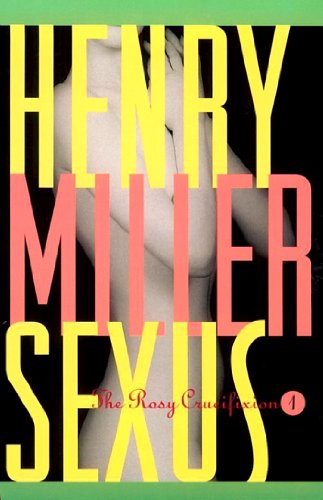Sexus: The Rosy Crucifixion Book 1 by Henry Miller
Sexus is a novel written by American author Henry Miller, first published in 1949. It is the first book in The Rosy Crucifixion trilogy, which also includes Plexus and Nexus. The novel follows the semi-autobiographical character of Henry V. Miller as he navigates his way through the bohemian culture of New York City in the 1920s. Sexus explores themes of sexuality, creativity, and personal fulfillment, and has been praised for its candid and provocative depiction of human relationships and desires. With its bold and unconventional writing style, Sexus has been regarded as a groundbreaking work in modern literature.

Sexus Plot Summary
Sexus is a novel by Henry Miller published in 1949. It is the first part of a trilogy that also includes Plexus and Nexus. The novel is known for its explicit, controversial content and is considered one of Miller’s most important works. Sexus explores themes of sexuality, spirituality, and identity, while also delving into the author’s own life experiences.
The novel follows the protagonist, Henry Miller, a struggling writer living in New York City during the 1920s. He is a bohemian artist who eschews traditional societal norms and conventions. Miller is constantly searching for meaning and fulfillment in his life, which leads him to explore his desires and emotions in a raw, uninhibited manner.
The story is narrated in a stream-of-consciousness style, providing readers with an intimate look into Miller’s thoughts and emotions. The novel is also interspersed with letters, diary entries, and fragments of poetry, adding to its experimental and nonlinear structure.
Sexus opens with Miller reflecting on his past and his relationships with women. He recounts his failed marriage to his first wife Mona, his tumultuous affair with his lover June, and his complicated friendship with the writer Anais Nin. Miller’s relationships with these women play a central role in the novel, shaping his understanding of love, desire, and intimacy.
Throughout the novel, Miller confronts his own sexuality and desires, often grappling with feelings of guilt and shame. He is drawn to unconventional relationships and experiences, pushing the boundaries of societal expectations. Miller’s exploration of his own desires leads him to question his identity and the nature of sexuality itself.
As the novel progresses, Miller becomes increasingly disillusioned with the world around him. He criticizes consumerism, materialism, and the superficiality of modern society. Miller seeks solace in his art and writing, believing that creativity is the only true source of meaning in his life.
Sexus is a deeply personal and introspective novel, drawing on Miller’s own experiences and emotions. The novel is both a reflection of the author’s life and a meditation on universal themes of love, identity, and creativity. Miller’s unconventional writing style and candid portrayal of sexuality set Sexus apart from other works of its time, cementing its status as a groundbreaking and controversial piece of literature.
In conclusion, Sexus is a powerful and provocative exploration of sexuality, love, and identity. Through the lens of Henry Miller’s experiences, the novel delves into the complexities of human relationships and the search for meaning in an often chaotic and confusing world. Despite its controversial content, Sexus remains a seminal work of modern literature, challenging readers to confront their own desires and emotions in a raw and unfiltered manner.
Sexus Key Takeaway
One key takeaway from the book Sexus is the exploration of sexuality and desire as integral components of the human experience. The novel delves into the complexities of sexual relationships, desires, and fantasies, shedding light on the innermost thoughts and emotions of the characters.
Sexus also challenges societal norms and conventions surrounding sexuality, presenting a raw and unfiltered look at human desire. The characters are depicted grappling with their own desires and struggles, highlighting the complexities and contradictions that can arise in intimate relationships.
Overall, the book emphasizes the importance of embracing one’s own sexuality and desires, while also acknowledging the complexities and challenges that can arise in doing so. It serves as a thought-provoking exploration of human sexuality and desire, encouraging readers to reflect on their own relationships and desires in a deeper and more nuanced way.
Conclusion
Sexus is a captivating, complex novel that delves deep into the complexities of desire, power, and human relationships. The conclusion of the book brings together all the strands of the story, revealing the full extent of the characters’ desires and struggles.
The review of Sexus would undoubtedly highlight its rich, evocative prose style as well as its nuanced exploration of sexuality and gender dynamics. Readers who enjoy literary fiction that challenges societal norms and presents a deep, psychological exploration of human nature will appreciate this book.
I would recommend Sexus to readers who enjoy the works of other literary giants such as James Joyce, Virginia Woolf, and Marcel Proust. They will appreciate the intricate character development and philosophical themes present in this work. Overall, Sexus is a thought-provoking and powerful novel that is sure to leave a lasting impression on readers.

No responses yet